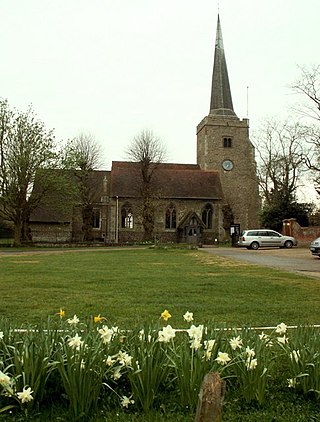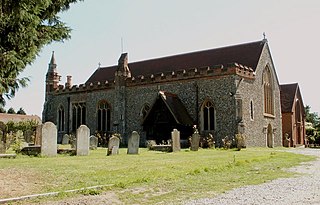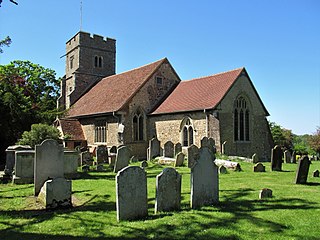
The Chelmer and Blackwater Navigation is the canalisation of the Rivers Chelmer and Blackwater in Essex, in the east of England. The navigation runs for 13.75 miles (22.13 km) from Springfield Basin in Chelmsford to the sea lock at Heybridge Basin near Maldon. Initial plans faced spirited opposition from Maldon, which were overcome by avoiding the town and terminating at Heybridge, and the navigation opened in 1797. There were some teething problems, and the engineer John Rennie was called back on two occasions to recommend improvements. The impact of the railways was less severe than on many canals, as there was never a direct line between Chelmsford and Maldon. The sea lock at Heybridge was enlarged after the Second World War, but trade gradually declined and ceased in 1972.

Chelmsford is a city in the City of Chelmsford district in the county of Essex, England. It is the county town of Essex and one of three cities in the county, along with Colchester and Southend-on-Sea. It is located 30 miles north-east of London at Charing Cross and 22 miles south-west of Colchester. The population of the urban area was 110,625 in the 2021 Census, while the wider district has 181,763.

Great Baddow is an urban village and civil parish in the Chelmsford borough of Essex, England. It is close to the city of Chelmsford and, with a population of over 13,000, is one of the largest villages in the country.

Danbury is a village in the City of Chelmsford district, in the county of Essex, England. It is located 33.5 miles (53.9 km) northeast of Charing Cross, London and has a population of approximately 6,500. It is situated on a hill 367 feet (112 m) above sea level.

The City of Chelmsford is a local government district with borough and city status in Essex, England. It is named after its main settlement, Chelmsford, which is also the county town of Essex. As well as the settlement of Chelmsford itself, the district also includes the surrounding rural area and the town of South Woodham Ferrers.

Hatfield Peverel is a village and civil parish at the centre of Essex, England. It is located 6 miles (10 km) north-east from Chelmsford, the nearest large city, to which it is connected by road and rail. The parish includes the hamlets of Nounsley and Mowden. Hatfield means a 'heathery space in the forest'; Peverel refers to William Peverel, the Norman knight granted lands in the area by William the Conqueror after the Norman invasion of 1066. Sited on high ground east of the River Ter, between Boreham and Witham on the A12, it is situated in the southern extremity of the Braintree District Council area. In 2020, the built-up area subdivision had an estimated population of 3,226. In 2011, the built-up area which includes Nounsley had a population of 3,950 and the parish had a population of 4,376.

Broomfield is a village and residential suburb in the City of Chelmsford district, immediately north of the city itself. It is the site of a major Accident & Emergency hospital. There are two public houses as well as primary and secondary schools and sports clubs.

Abridge is a village in Essex, England. It is on the River Roding, 16 miles (26 km) southwest of the county town of Chelmsford. The village is in the district of Epping Forest and in the parliamentary constituency of Brentwood and Ongar. It is part of the civil parish of Lambourne and is served by Lambourne Parish Council.

Chelmsford is a constituency in Essex represented in the House of Commons of the UK Parliament since 2017 by Vicky Ford of the Conservative Party.

Little Baddow is a village to the east of Chelmsford, Essex.

Sandon is a village and civil parish just off junction 17 of the A12 in Essex, England, adjacent to Great Baddow and close to Danbury. The population taken at the 2011 Census includes Howe Green and totals 1,613. It was known for an ancient oak tree covering most of the village green. This rare Spanish oak was planted in 1888 to mark Queen Victoria's Golden Jubilee. It was removed for safety reasons in 2000 after collapsing due to long-standing fungal infection. Three new oak trees were planted on the village green to continue its legacy and mark Queen Elizabeth II's Golden Jubilee.

West Hanningfield is a small village and civil parish in south Essex, England. It is located approximately 5 mi (8.0 km) south-south-east of the county town of Chelmsford. The village is in the borough of Chelmsford and in the parliamentary constituency of Maldon.

Chelmsford Hockey Club is a field hockey club based in Chelmsford, Essex, England. The club's home ground is at Chelmer Park, with a capacity of 100 seats and numerous standing.

Chelmer Village is a housing, retail and industrial development in the east of Chelmsford, Essex. The development was started by Countryside Residential PLC in 1978, using a holistic approach to create a self-contained community on previously greenfield land, of the manors of Springfield Barnes and Cuton Hall. It comprises a variety of modern suburban dwellings, the Chelmer Village Retail Park and Dukes Park Industrial Estate.

Little Waltham is a village and civil parish just north of Chelmsford, in Essex, England. It is adjacent to the village of Great Waltham. The Domesday Book refers to the two villages as Waltham, consisting of several manors. The site of an Iron Age village was excavated before upgrading the main road north between the current villages.

Moulsham is a suburb of Chelmsford, Essex, England. It is located to the south of the city centre and has two distinct areas: Old Moulsham and Moulsham Lodge.

Galleywood Common is a 44.6 hectare Local Nature Reserve in Chelmsford in Essex, near the village of Galleywood. It is owned and managed by Chelmsford City Council.

Samuel James Cook is an English cricketer. He made his first-class debut on 31 March 2016 for Loughborough MCCU against Surrey as part of the Marylebone Cricket Club University fixtures. He played for Essex against the West Indies during their tour of England in August 2017. He was part of the 2017 County Championship winning Essex squad.




















